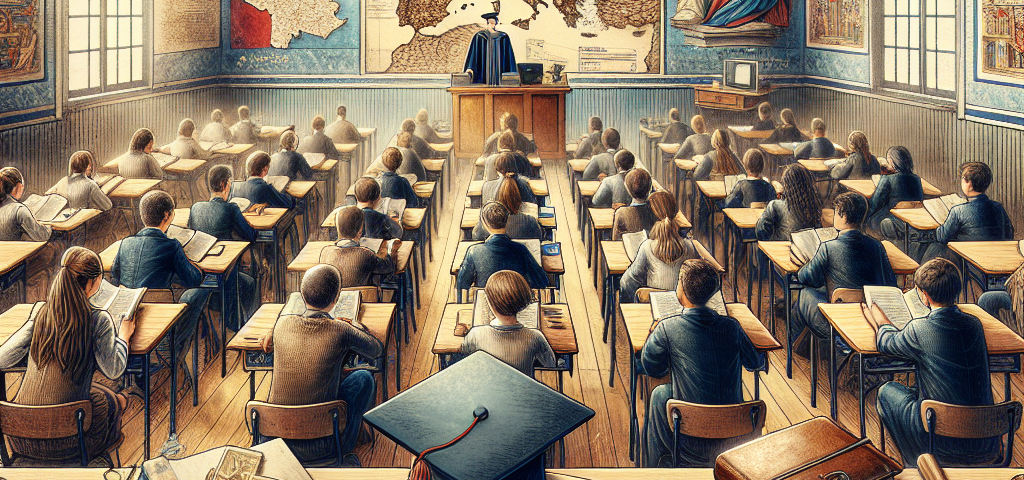
Educational Exchange Programs: Bridging Cultures in French Secondary Schools
May 31, 2025
Mastering the French Subjunctive: A Key Element in Fluency
June 12, 2025
As France continues to be a hub for higher education in Europe, understanding the progression from secondary school to university is crucial for both students and parents. The French educational system is known for its rigorous academic structure and emphasis on knowledge acquisition, making it essential for students to be well-prepared for the challenges that higher education presents.
The French Secondary Education System
French secondary education comprises two main stages: Collège (middle school) and Lycée (high school).
Collège (Ages 11-15)
During collège, which spans four years, students are introduced to a broad curriculum that includes subjects like French, mathematics, history, geography, science, and foreign languages. This stage culminates in the Diplôme National du Brevet (DNB), which assesses students’ knowledge and skills.
The primary focus in collège is to ensure a strong foundation across various disciplines, fostering critical thinking and analytical skills. Such a well-rounded education is imperative as it prepares students for the specialized tracks they can pursue in high school.
Lycée (Ages 15-18)
Upon completion of collège, students have the option to choose between different types of lycée:
- Lycée Général – Aimed at students preparing for university education, with a focus on academic rigor.
- Lycée Technologique – Focuses on more practical applications and technical skills, preparing students for specialized universities or vocational training.
- Lycée Professionnel – Designed for students entering the workforce or pursuing vocational qualifications.
Students in lycée are required to take the Baccalauréat (commonly known as the Bac), a national exam that plays a crucial role in university admission. The Bac is divided into streams—literary, scientific, and economic/social—reflecting students’ interests and future academic goals.
University Readiness
Academic Preparation
To prepare for higher education, students must not only excel academically but also develop skills that aid in the transition from secondary to tertiary education. This includes:
-
Time Management: University demands a high level of personal responsibility. Students must learn to manage their time effectively, balancing coursework, assignments, and extracurricular activities.
-
Critical Thinking: Higher education encourages independent thought and critical analysis. Students should focus on developing these skills during lycée, engaging in debates, and tackling complex problems.
- Research Proficiency: Universities require students to conduct extensive research. Familiarity with libraries, online databases, and academic writing at the lycée level can greatly enhance a student’s university experience.
Soft Skills Development
In addition to academic skills, it is essential for students to cultivate soft skills, which are increasingly valued in higher education and the workforce. These include:
-
Communication: Participation in group projects and presentations can help improve verbal and written communication skills.
-
Collaboration: Many university programs emphasize group work. Building teamwork skills in secondary school can ease the transition.
- Adaptability: The ability to adapt to new situations and learn from diverse perspectives is vital in a university environment, where students will encounter peers from various backgrounds.
Support Systems for Students
Recognizing the challenges associated with this transitional phase, many French secondary schools offer resources and support systems to help prepare students for higher education:
-
Counseling Services: Career counselors at lycées can guide students in choosing the right academic path based on their interests and strengths.
-
Workshops: Many schools provide workshops on study techniques, time management, and research skills, which can bolster students’ preparedness.
- Extracurricular Activities: Engaging in clubs, sports, and community services can enhance a student’s resume and provide valuable life skills.
Conclusion
In conclusion, the pathway from French secondary education to higher education is marked by a structured yet personalized approach that aims to prepare students for future academic success. With a robust curriculum, emphasis on both hard and soft skills, and a support system in place, students can transition from lycée to university with confidence. As France continues to foster a culture of academic excellence, both the students and the educational institutions play crucial roles in shaping the future of higher education. Preparing for this journey starts early, making the experiences and lessons from secondary school all the more vital in realizing the potential of every student.

